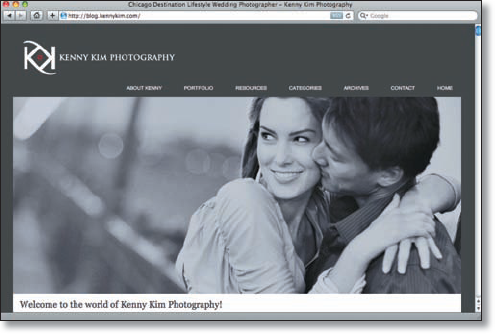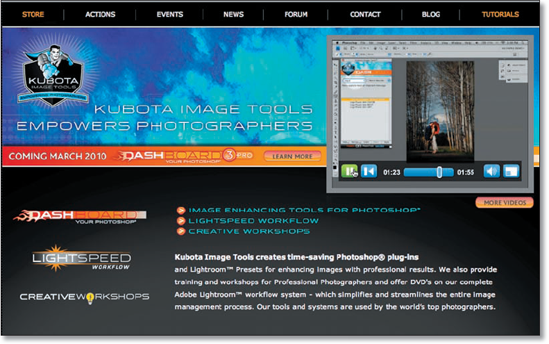As wedding photographers, our work does not end when we finish shooting the wedding. There is another aspect to this business that constantly needs attention in order to be successful: marketing. In an ideal world, we would get a couple referrals after each wedding, but the reality is we need to market ourselves to our target audience and always think a few steps ahead to stay in the game.

You can never take back your first impression. I know this seems so simple, yet many people don't take it seriously. Every time you meet with a prospective customer you need to make sure you look your best. Every time you work at a wedding or any event, you need to look and act your best. Everything you present, from how your shoes look to how your Web site looks, affects how people view you, so it is important to make a good impression.
As a general rule of thumb, when shooting a wedding, I dress in a similar fashion as the guests. This helps me fit in and makes everyone feel more comfortable with my presence. For formal events, I wear a suit. I actually custom designed a suit last year because none of the suits I purchased fit me well and I got tired of wearing things that didn't make me feel comfortable. The investment was worth it and now every time I wear the suit, I get compliments. Not only does that make me feel good, it makes the bride feel good knowing she invested in a great photographer with good taste. The bottom line is I make sure I always look my best when I am working in order to make a positive impression.
Likewise, your Web site and other marketing tools need to show your best images, those that will make a lasting first impression. This means you need to constantly make sure your Web site, blog and marketing materials are up to date and portraying the latest and greatest work.
Part of marketing your business is creating a brand identity. This includes creating a name, logo and all types of marketing materials that are consistent and reflect who you are as a photographer. Often, it is a good idea to work with a professional designer who has the skills to help you develop what you need.

Some things to consider:
Personality: Does your company's name and identity match your personality? When a prospective client looks at your logo, Web site or other marketing materials can they get a sense of who you are?
Style: Does your identity match your style? If you are a casual, relaxed photographer who shoots in a more photojournalistic style, then having a classic look to your marketing materials would be misleading.
Client: Make sure you create an identity and marketing materials that will speak to people looking for wedding photographers. There is no need to include sports or landscapes photos in your portfolio since it would send mixed messages to potential clients.
Consistency: Your logo, business card, Web site, letterhead and other marketing materials need to have a consistent look and feel. If you are having difficulty coming up with one that works, consult a professional graphic designer to help. It is worth the investment.
Just because you have talent and a business, doesn't mean customers are going to beat a path to your door. Networking is by far the best way to get more jobs and perhaps the number one reason for my success in this industry. Even though it might seem counterintuitive, some of the best people to network with are other photographers because: 1) by establishing good relationships with them, they can refer weddings to you that they cannot shoot because they are already commissioned for the same date; 2) you can build a network of photographers who can serve as your second shooters and vice versa; and 3) often we get job requests for things outside our specialty, and we can refer those jobs to others.
Take advantage of meeting other photographers at workshops and other educational gatherings. There are local groups of community photographers meeting everywhere these days. If you can't find one, why not create your own? It doesn't require an elaborate meeting. A simple coffee talk or lunch appointment should do the trick.
Here are some tips on networking:
Introduce yourself: Every event, class, and workshop you attend is an opportunity to meet other photographers who have the same general interests as you. Make sure to introduce yourself to everyone and remember that first impressions count.
Use social media, forums to be proactive: With the proliferation of social media, from Facebook to Twitter, it is easier to find and contact people who are going to the same events as you. Get in contact with other attendees and set up meetings or just make contact. See if the event has a forum and introduce yourself there before the event even starts making it easier to connect at the event.
Don't eat alone: Sitting down to a casual meal with some new acquaintances is a great way to make new friends. Keep in mind you can extend your network in the off hours just as much as during the working hours.
Diversify: Just because I shoot weddings and my main focus is on wedding photography, doesn't mean I don't have other types of photographers in my network. Diversify so you will have contacts into different types of work and different shooting styles. You never know when you will be offered a job that needs a different touch or second photographer with a certain style. Likewise you never know when someone in your network will need a photographer like you. Don't limit your network.
Keep in touch / follow up: This is the most important part of networking.

Meeting other photographers is good; staying in touch with them is better. All the work you put into meeting and finding people to share your network is wasted if you don't keep in constant contact with them. Exchanging business card is not the end of networking; it is just the beginning. If you do not follow up, chances are you will be forgotten within few days. This can be as simple as a quick email stating how nice it was to meet them and letting them know you are looking forward to speaking with them again. People will remember your follow up conversations more than what you talked about during your meeting. Twitter or Facebook has made it even easier to keep in touch. Nothing beats face-to-face networking, but these online social media tools are a great way to stay connected. Leaving comments on another's blog is also great. Not only does it make the other person feel good, it provides a link for their visitors to reference back to your site giving you more exposure.
I cannot stress how important continuing education is. Most photographers (including myself) did not have formal training in photography, and with technology continually improving and changing, we need to always be sharpening our skills and mastering our craft. Going to workshops, classes, seminars and other photography training is essential not only to improve your images, but to help you network and grow your business. It can be costly to attend many of them so choose carefully and think of them as an investment for your future. I have gained incredible knowledge and a great network of friends from these events.
There are many great workshops and resources available. Do some research and talk to people who have attended them in the past to find out what they got out of it and if it's what you are looking to improve in your business. In my opinion, here are some of the best places to learn both in person and on the Internet.
Workshops:
Bob & Dawn Davis (
www.davisworkshops.com) My good friend and mentor, Bob and his wife are not only great photographers, but great people.Yervant (
www.yervant.info) - These workshops and seminars are packed with down-to-earth, doable and up-to-date information to take your skills and business to higher levels.
Joe Buissink (
www.joebuissink.com) - Learn from the wedding photographer to the stars how to push beyond your comfort zone.Jim Garner (
www.jgarnerphoto.com) – Jim teaches many workshops, designed to make you a better photographer and business owner.David Jay (
www.davidjay.com) - Named one of the top 15 wedding photographers in the world by Wedding Photojournalist Association.Mike Colón (
www.mikecolon.net) - Mike regularly teaches a workshop called "The 7 Most Important Topics in Wedding Photography."Kenny Kim & Ray Santana (
www.portfolioplusworkshop.com) - Shameless plug for our workshop teaching the basics of wedding photography and helping you build your portfolio. We also invite other great photographers to teach us about their specialties.
Online Resources:
Digital Wedding Forum (
www.digitalweddingforum.com) - A great place for a wealth of information regarding wedding and portrait business.[b] School (
www.thebschool.com) - An online community started by [b]ecker who used to teach Party of [5] workshops before he expanded his education to a broader audience. It allows photographers to share their images and network, and offers great tutorials.Kelby Training (
www.kelbytraining.com) - A site full of training videos by some of the top photographers in the world. Learn at your own pace with subjects ranging from small flashes to wedding portraits.Kevin Kubota Training (
www.kubotaimagetools.com) - Kevin offers a wide range of workshops all over the world. From Italy to Oregon, the workshops are great learning experiences taught by one of the greats.The I.C.E. Society (
www.theicesociety.com) - This was started by Jerry Ghionis, one of my favorite wedding photographers in the world to Inspire, Challenge & Educate fellow photographers from all over the world.


Conventions:
The following conventions offer a variety of classes and instruction for just about anything you want to learn about the wedding photography industry. Each also has a tradeshow going on at the same time, where many vendors display their latest products.
Wedding & Portrait Photographers International (WPPI) -
www.wppionline.com: Usually held in March in Las Vegas, WPPI is probably the single most important event for wedding photographers to attend.Imaging USA (
www.imagingusa.org) - The longest running national photographic convention, expo, and image exhibition in the United States, Imaging USA draws thousands of professionals from around the world. It is usually held in January. Digital Wedding Forum Convention (www.digitalweddingforum.com) is usually held at the same time and in the same city.Skip's Summer School (
www.mei500.com) - Held in August, this provides solid teaching by some of the best in the business at a smaller and more intimate setting. Great for someone starting out or who wants to take their business to the next level.
Sitting and learning is great, but remember shooting is better. Get out and practice. I am always humbled by one of my mentors, Bob Davis. He has so many years of photography experience under his belt, yet he is always practicing and encourages others to do the same. Try new techniques, and remember to be creative. The more you learn, the better you'll become, and your business will begin to market itself.
